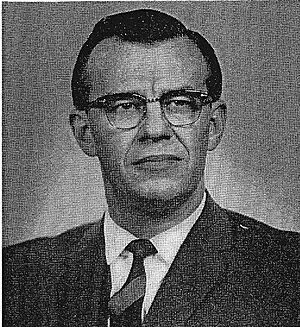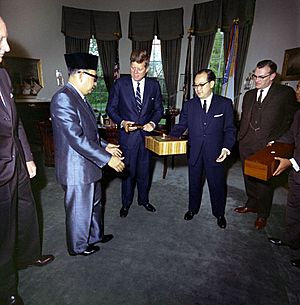Roger Hilsman facts for kids
Quick facts for kids
Roger Hilsman Jr.
|
|
|---|---|

Hilsman during the early 1960s
|
|
| 8th Assistant Secretary of State for Far Eastern Affairs | |
| In office May 9, 1963 – March 15, 1964 |
|
| President | John F. Kennedy Lyndon B. Johnson |
| Preceded by | W. Averell Harriman |
| Succeeded by | William Bundy |
| 2nd Director of the Bureau of Intelligence and Research | |
| In office February 19, 1961 – April 25, 1963 |
|
| President | John F. Kennedy |
| Preceded by | Hugh S. Cumming Jr. |
| Succeeded by | Thomas Lowe Hughes |
| Personal details | |
| Born | November 23, 1919 Waco, Texas |
| Died | February 23, 2014 (aged 94) Ithaca, New York |
| Political party | Democratic |
| Spouse | Eleanor Hoyt Hilsman |
| Children | 4, including Hoyt Hilsman |
| Residences | Manhattan, New York Lyme, Connecticut |
| Education | United States Military Academy Yale University |
| Profession | Soldier, statesman, scholar, author |
Roger Hilsman Jr. (November 23, 1919 – February 23, 2014) was an American soldier, government official, and writer. He fought in World War II in Asia, first with a special unit called Merrill's Marauders. He was wounded in battle. Later, he became a leader of a small group of fighters (guerrillas) for the Office of Strategic Services (OSS).
After the war, Hilsman worked for Presidents John F. Kennedy and Lyndon B. Johnson. He served in the U.S. State Department. He was the Director of the Bureau of Intelligence and Research from 1961 to 1963. Then, he was the Assistant Secretary of State for Far Eastern Affairs from 1963 to 1964.
Hilsman played a big role in how the U.S. dealt with South Vietnam at the start of the Vietnam War. He believed the conflict was about politics as much as fighting. He thought the leader of South Vietnam, Ngô Đình Diệm, should be removed from power. Hilsman left the government in 1964 to teach at Columbia University. He wrote many books about American foreign policy. He also ran for Congress in 1972 but did not win.
Contents
Early Life and Education
Roger Hilsman Jr. was born on November 23, 1919, in Waco, Texas. His father, Roger Hilsman Sr., was an officer in the United States Army. Roger Jr. grew up on different military bases. He spent some of his childhood in the Philippines.
He went to Sacramento High School in California. He was a leader in a military training program there. After high school, he traveled in Europe. He then attended the United States Military Academy at West Point. He graduated in 1943 as a second lieutenant.
World War II Experiences
After graduating, Hilsman went to fight in Southeast Asia during World War II. He joined a special unit called Merrill's Marauders. This unit fought the Japanese in the jungles of Burma. Hilsman was wounded in May 1944 during a battle.
After he recovered, Hilsman joined the Office of Strategic Services (OSS). This was a U.S. spy agency. He led a group of about 300 local fighters (guerrillas) behind Japanese lines in Burma. He liked using guerrilla tactics, which involve surprise attacks and quick retreats. His group kept a much larger Japanese force busy away from the main battle.
In 1945, after Japan surrendered, Hilsman was part of an OSS mission. They parachuted into Manchuria to free American prisoners of war. There, he found his father, who had been captured by the Japanese. His father was one of the first prisoners to be freed. Hilsman was promoted to captain. He later wrote a book about his war experiences called American Guerrilla: My War Behind Japanese Lines.
After the war, Hilsman worked for the OSS. When the Central Intelligence Agency (CIA) was formed, he worked there too.
Becoming a Scholar and Advisor
In 1946, Hilsman married Eleanor Willis Hoyt. They had four children. The Army helped Hilsman go to Yale University. He earned a master's degree in 1950 and a Ph.D. in political science in 1951. He studied how countries interact with each other.
Hilsman worked on plans for the North Atlantic Treaty Organization (NATO) in Europe. He left the Army in 1953 but stayed in the reserves. He then became a researcher and teacher at Princeton University and Johns Hopkins University.
In 1956, he wrote a book called Strategic Intelligence and National Decisions. This book was well-regarded in government. He also worked for the Library of Congress. There, he met Senator John F. Kennedy.
Working for President Kennedy
When John F. Kennedy became president, Hilsman joined his team. In February 1961, he became the Director of the Bureau of Intelligence and Research for the U.S. Department of State. His job was to study world events and help plan U.S. foreign policy. Hilsman quickly became an important planner.
Because of his experience in guerrilla warfare, Hilsman pushed for the U.S. military to learn how to fight against guerrillas. He was also involved in the U.S. response to the Cuban Missile Crisis in 1962.
Shaping Vietnam Policy
Hilsman helped create American policy for Vietnam in the early 1960s. In 1962, he suggested that the war was mostly a political fight. He believed that winning over the Vietnamese people in rural areas was key. He also suggested that the South Vietnamese army should use guerrilla tactics. This led to the Strategic Hamlet Program. This program moved rural villagers into protected villages to keep them safe from the Viet Cong. However, Hilsman later said the program was not carried out well.
In December 1962, President Kennedy sent Hilsman to South Vietnam to find out what was really happening. Hilsman's report, called the Hilsman–Forrestal Report, was given to Kennedy in January 1963. It showed problems with the South Vietnamese government. It also showed that President Ngô Đình Diệm and his brother were corrupt. The report said the Diệm government was losing support from its people. Even so, the report was somewhat hopeful, saying the U.S. was "probably winning." This report led to more U.S. involvement in Vietnam.
In May 1963, Hilsman became the Assistant Secretary of State for Far Eastern Affairs. He moved up quickly because Kennedy liked that he challenged military ideas. Around this time, the Buddhist crisis began in South Vietnam. The government cracked down on Buddhist monks. Hilsman became the strongest supporter of removing Diệm from power.
On August 24, 1963, Hilsman helped write an important message, Cable 243, to the U.S. Ambassador in South Vietnam. This message said the U.S. would no longer support Diệm's brother. It also hinted that the U.S. would support a change in leadership if Diệm did not remove his brother. This cable was seen as giving a quiet approval for a coup against Diệm.
On November 1, 1963, a coup happened in South Vietnam. South Vietnamese generals carried it out. The U.S. had encouraged them. Diệm and his brother were arrested and killed the next day. This event caused political problems in South Vietnam and led to even more U.S. involvement.
Changes Under President Johnson
After President Kennedy was assassinated in November 1963, Hilsman stayed in his job under the new president, Lyndon B. Johnson. However, Johnson wanted fewer opinions on foreign policy. Hilsman's ideas were no longer being heard. Many officials, including the Secretary of Defense and Secretary of State, did not like Hilsman. They thought he questioned the military too much and caused problems.
Hilsman also disagreed with Johnson's approach to the Vietnam War. Hilsman believed in a political solution, while Johnson focused more on military action. Johnson wanted Hilsman to leave.
On February 25, 1964, the White House announced that Hilsman had resigned. Hilsman still believed in fighting the war using a strategy that focused on winning over the local people. He was against increasing military attacks on North Vietnam. He thought such attacks would not work until the efforts in the South improved. His ideas were not followed by the Johnson administration. Hilsman's last day in office was March 15, 1964.
Life as a Professor and Candidate
After leaving government, Hilsman became a professor at Columbia University in 1964. He taught about foreign policy. His classes were known for his stories about famous people from the Kennedy administration. He also taught at the university's Institute of War and Peace Studies.
Hilsman wrote many books. His 1967 book, To Move a Nation: The Politics of Foreign Policy in the Administration of John F. Kennedy, was very important. It was one of the first books by a policy maker to disagree with the way the Vietnam War was being fought. The The New York Times Book Review called it a "highly informative study."
Hilsman continued to speak out about the Vietnam War. He said the war was not "winnable" politically. He believed the U.S. should reduce its military involvement. He always said that if Kennedy had lived, he would not have made the war bigger like Johnson did. Hilsman strongly supported Robert F. Kennedy's presidential campaign in 1968.
In 1972, Hilsman ran for election to the United States House of Representatives in Connecticut. He focused on local issues and foreign policy. However, he lost the election by a large amount.
Hilsman retired from Columbia University in 1990. He said that teaching was the most satisfying part of his career.
Later Years and Legacy
In 1994, President Bill Clinton appointed Hilsman to the National Security Education Board. Hilsman stayed active in local politics in Lyme, Connecticut. He continued to write books into his eighties.
Roger Hilsman Jr. passed away on February 23, 2014, at the age of 94. He was buried with full honors at Arlington National Cemetery.
Books by Roger Hilsman
Hilsman wrote many books about American foreign policy and other topics. Some of his works include:
- Strategic Intelligence and National Decisions (1956)
- To Move a Nation: The Politics of Foreign Policy in the Administration of John F. Kennedy (1967)
- Politics of Policy Making in Defense and Foreign Affairs: Conceptual Models and Bureaucratic Politics (1971)
- American Guerrilla: My War Behind Japanese Lines (1990)
- The Cuban Missile Crisis: The Struggle Over Policy (1996)
See also
- Krulak Mendenhall mission
- McNamara Taylor mission
- Reaction to the 1963 South Vietnamese coup
 | Percy Lavon Julian |
 | Katherine Johnson |
 | George Washington Carver |
 | Annie Easley |


